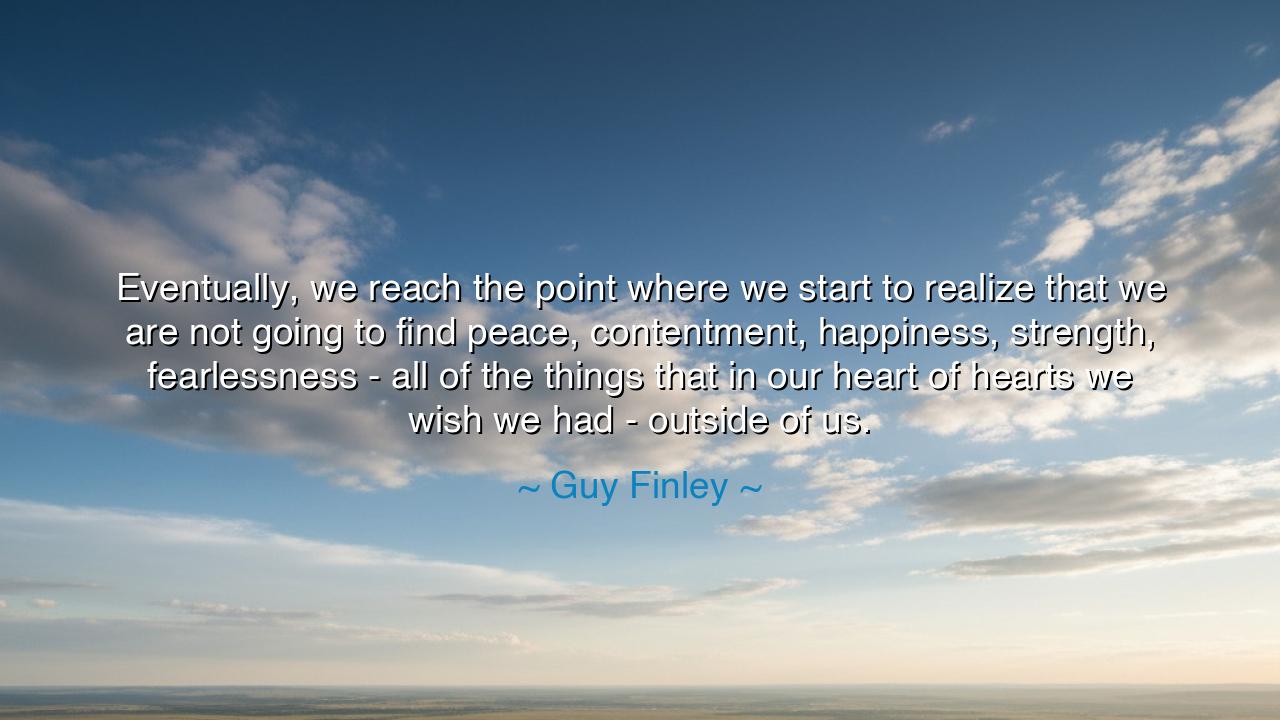
Eventually, we reach the point where we start to realize that we
Eventually, we reach the point where we start to realize that we are not going to find peace, contentment, happiness, strength, fearlessness - all of the things that in our heart of hearts we wish we had - outside of us.






"Eventually, we reach the point where we start to realize that we are not going to find peace, contentment, happiness, strength, fearlessness—all of the things that in our heart of hearts we wish we had—outside of us." Thus spoke Guy Finley, unveiling a truth as ancient as the mountains: that man’s deepest treasures are not granted by the world, but discovered within. To seek them only in wealth, applause, or conquest is to wander endlessly in the desert. The true wellsprings lie hidden in the soul.
The ancients proclaimed the same. The Stoics taught that happiness cannot be given by fortune, nor taken by misfortune, for it belongs to the realm of the spirit. Socrates declared that no evil can harm the good man, for his strength lies not in possessions but in virtue. The Buddha, too, left his palace to learn that peace is not found in outward indulgence, but in inner awakening. From many tongues the same truth resounds: what we long for cannot be bought, seized, or begged—it must be cultivated within.
History bears witness in the life of Nelson Mandela. For decades he was confined within prison walls, stripped of every outer liberty. Yet from that place of darkness he drew upon the strength within, refusing hatred, embracing forgiveness, and inspiring a nation. He proved that fearlessness is not the absence of danger, but the mastery of the heart. No worldly gift could have given him such power; it was born in the secret chambers of his own spirit.
So too in the story of Helen Keller. Deaf and blind from infancy, she was cut off from the outward world. Yet in her struggle she discovered an inner flame—contentment, peace, and unyielding strength—that guided her to inspire millions. Her life proclaims Finley’s wisdom: that the treasures of the heart are never bestowed by circumstance, but uncovered by endurance and self-knowledge.
Therefore, let this lesson be given to all generations: cease wandering in search of what the world cannot give. The applause will fade, riches will pass, even kingdoms will crumble. But within you lies the fountain of peace, the fortress of strength, the fire of happiness that no storm can quench. Seek inward, and you will find what eternity has already placed in your heart. For all that is greatest in man is not outside—it is already within.






HNAnh Hao Nguyen
Philosophically, I’m torn between ambition and enoughness. If fulfillment isn’t out there, how do we keep striving from curdling into anxious chasing? Maybe the move is to seek from wholeness, not for it. Could you propose a reflection set: What am I unwilling to feel that I keep outsourcing to achievements? Which pursuits would still matter if no one knew? What’s the smallest act today that expresses my values without earning a reward? I want a path where depth fuels drive rather than replacing it.
Q_Phuong Quyen _8B
Could we translate this into a 30-day protocol? Week 1: declutter inputs—mute three unhelpful feeds, add one nourishing source, and set a daily 10-minute stillness block. Week 2: clarify values—pick three, write one behavior that enacts each, and do the smallest version daily. Week 3: resilience drills—one intentional discomfort (cold rinse, tough email) plus immediate self-soothing. Week 4: integration—track what actually shifted and prune what didn’t. I’d like a one-page tracker with checkboxes and a weekly reflection to avoid drifting into vague aspiration.
Wwinny
Relationally, I don’t think the answer lives only in solitude. Humans regulate emotion together; calm is contagious. How do we cultivate inner steadiness while leaning into co-regulation—friend walks, shared silence, service? I’d love a small experiment: schedule two weekly “anchor” interactions that leave you grounded, and keep a log rating before/after mood and clarity. If the needle moves, treat connection as part of the inner toolkit, not a distraction. What signals show dependence versus healthy support—loss of agency, boundary fuzziness, or reciprocity disappearing?
HAphan thi hien anh
I’m curious about the body’s role. If contentment is an inside job, is it actually interoception—getting better at sensing and interpreting internal signals? What practices sharpen that faculty without mystique: slow nasal breathing, a two-minute scan for tension before decisions, and labeling sensations neutrally (“warmth,” “tightness”). Pair that with a short “meaning check”: what value is this feeling protecting? I’d appreciate indicators of progress that aren’t vibes—fewer stress relapses, easier sleep onset, quicker recovery after setbacks—so the work feels tangible, not ethereal.
VHVU HOAN
Part of me worries this message can slide into quiet blame. Not everyone can bootstrap serenity while juggling debt, illness, or unsafe workplaces. How do we honor inner work without ignoring material conditions? I’d love a both/and framework: cultivate self-compassion and attention training while also pursuing structural supports—fair pay, safer housing, community care. Could you sketch a checklist that keeps the balance honest: if mood lifts only in calm environments, what external changes are overdue—and if circumstances are fixed, which inner skills help now?